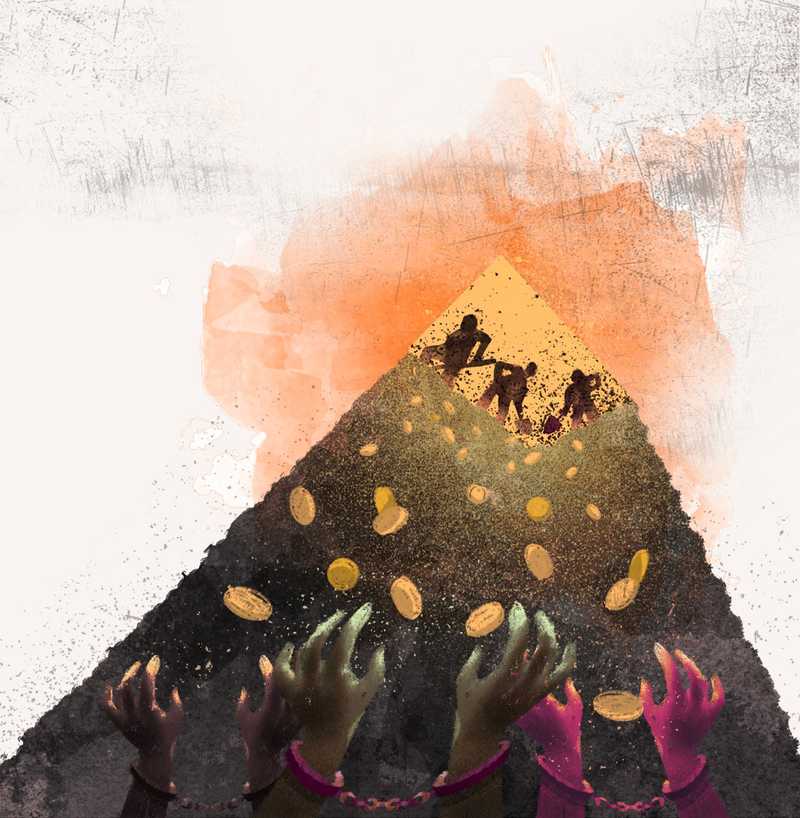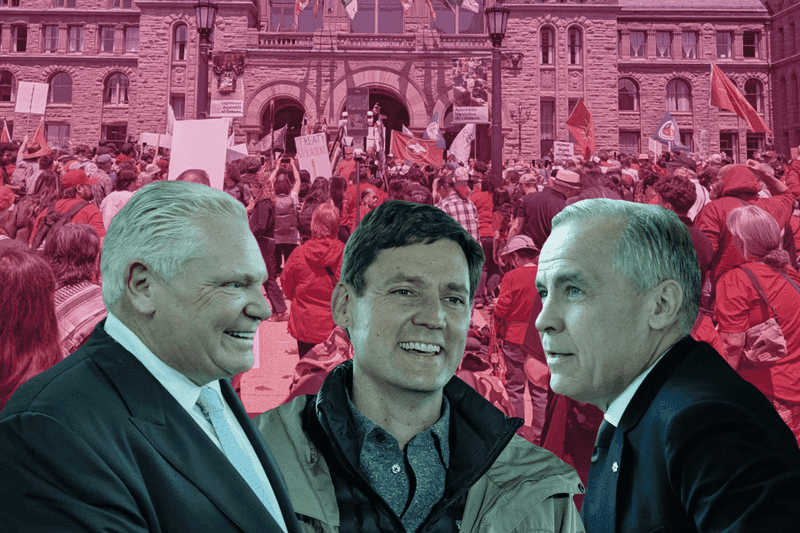
This essay is part of the “Debt and Power” series of Progressive International’s Debt Justice Blueprint.
Debt, according to standard economic assumptions, emerges from a purely private exchange. Independent rational agents willingly enter into a contract in a free market. That market, in turn, sets a fair price for the debt. Freedom and fairness: these are the assumptions that underpin the common narrative about debt and indebtedness.
This essay sets out to explode these assumptions. Contrary to the common narrative, the massive dollar-denominated debts in the Global South did not arise from private exchange in a regulatory vacuum. Rather, they are the product of an international financial system carefully designed to facilitate neo-colonial extraction.
Debt is a vicious cycle that is neither free nor fair. A mix of dependency and deprivation has forced governments and households to enter into debt in order to maintain basic living standards. A large share of income flows to the creditors at the top of the income distribution. In turn, the creditors invest their capital to lobby for laws, regulations, and foreign policies in their favor.
This section, discussing the US and Lebanon, sheds light on the neo-colonial dynamics of debt by demonstrating how governments and creditors collude to sustain this vicious cycle, and secure a steady flow of financial returns for themselves in the process.
The Great Recession: A Crisis of Accumulation
It is no longer a controversial position that the financial crisis of 2008 was a result of regulations that favored Wall Street. On the contrary, from the Economics department at the University of Chicago to the United States Financial Crisis Inquiry Commission (FCIC), this view of the financial crisis has become conventional wisdom.
Others blame the housing policies of the period, which sought to expand homeownership by aggressively deregulating the mortgage market, and thus contributed to unsustainable housing price increases and rising indebtedness. The debate is often focused on whether the failure lay with home-owners who bought houses they couldn’t afford, or real estate investors who manipulated the market for speculative gain.
But these stories ignore the global scale of financialization that preceded the 2008 crisis—despite US policy not applying around the world. Indeed, we need only look to cities like Beirut, Athens, Barcelona, Johannesburg, São Paulo, and San Francisco to notice a single dynamic operating on a global scale. What is described as the global debt crisis is effectively a crisis of accumulation: around the world, unpaid debt goes hand-in-hand with surpluses paralyzed in banks—some earning negative interest rates, such as in Europe, and others earning astronomical rates of return in national Ponzi schemes that sooner or later come crashing down, such as in Lebanon.
To make sense of this dynamic, let us turn to Lebanon itself, one of the most vibrant cases of neo-colonial extraction through the process of unending financialization.
Lebanon: How the Global Financial Oligarchy Operates
The Cold War is a misnomer, for that war was not experienced as “cold” on many fronts from South Africa to Eastern Europe. Lebanon, for one, was drenched in blood for a quarter century before the fall of the Soviet Union resolved its civil war instantly. The warring militias sat at a negotiating table moderated by international power brokers to share the spoils of reconstruction funded by sovereign debt. Like many other countries in the global South in the nineties, Lebanon pegged its local currency to the US dollar. The latter had been the world currency since WWII, when Americans flooded the world with dollars in an effort to stave off Soviet socialism. As of the 1990s, the fixed exchange-rate regime and resulting high interest rates allowed foreign capital to enter these countries, benefit from high interest rates and exit safely, to the advantage of both foreign investors and the domestic financial sector acting as their intermediary.
Financed by heavy inflows of capital from abroad, local creditors emerged as powerful political agents. In Lebanon, bankers were appointed to many key positions in executive authorities, and their lobby partnered with the leadership of the central bank to impose a monetary and fiscal policy that served their interests. Today, politicians who are or have been in government since the end of the Civil War directly own about forty percent of assets in the local banking sector—not accounting for the assets owned by their family members, partners, and cronies. As a result, Lebanon boasts one of the lowest tax rates on interest income, while banks have about three quarters of their assets (either directly or indirectly through the central bank) invested in an unjustifiably expensive sovereign debt. These politicians-cum-bankers at times paid themselves more than 35 percent in annual returns on loans to the public. Over three decades, debt servicing constituted about a third of government expenditure and took up more than half of government revenues. The latter consisted overwhelmingly of flat consumption taxes that disproportionately burdened the poor and middle classes—a perverse upwards transfer of wealth.
In Lebanon, as elsewhere, the cost of these financial profits has been paid for by domestic manufacture and agriculture. These crucial sectors lost access to credit because of high interest rates. They faced ever-increasing rents, and their competitiveness was eroded on domestic as well as foreign markets because of the overvaluation of the currency. In other words, the huge inflows of capital only served to inflate real estate prices and financial profits, rather than fund productive activities that create stable jobs. With post-Cold War financial liberalization, policy autonomy became constrained, as countries that failed to comply with investor interests would get punished by capital flight. Financial elites gained greater influence over policy. They then pushed for policies that further transferred income from agriculture and industry to the financial sector, increasing income inequality and contributing to unemployment, wage stagnation, and consequently, private indebtedness.
With agriculture and manufacturing rendered unprofitable, real estate became the most lucrative option for the wealth-accumulating elite who remained on the hunt for high returns. Since the 1990s, the only semblance of a housing policy in Lebanon has been subsidies by the Central Bank on home mortgages offered by local banks. Data gathered by the Beirut Housing Monitor in 2020 shows beyond doubt that this policy has failed the poor. In a vicious circle, it has inflated real estate prices and encouraged speculation and rent-seeking behavior. Not only has this policy excluded a majority who cannot afford these mortgages, but it also led to precarity in homeownership. The lack of urban planning and policies for affordable housing effectively leaves homeownership vulnerable to the whims of economic cycles, like any commodity.
This example shows how the exponential growth of private debt is tightly linked to the growth of sovereign debt. Both are the work of a political alliance between transnational financial interests and local ones in control of the state. This is most visible in the aftermath of sovereign defaults.
In the case of Lebanon, an uprising erupted in October 2019 against the imposition of a tax on Whatsapp calls. The state intended to resort to austerity measures to sustain its strained finances until it could be rescued again by “the international community.” International donor and creditor conferences had shored up the Lebanese system repeatedly since the 1990s, expanding an increasingly unsustainable public debt that was extremely lucrative to investors while it lasted. These conferences were staffed with the foreign policy officials of the world’s superpowers, who had an interest in the maintenance of the status-quo in Lebanon for geopolitical reasons; by officials from the IMF and the World Bank; and by the functionaries of global finance.
Significant factions of the Lebanese uprising protested the continued repayment of the public debt. Since the default was inescapable, it made no sense to use the last of Lebanon’s dollar reserves to repay creditors. Those dollars, the demonstrators argued, were better spent on funding a few additional months of vital imports—namely fuel, flour, and medicine. In any case, more than 85 percent of the debt was owned by the local banks whose only lifeline is the Lebanese government, their profits being more akin to a windfall of rents, rather than the result of financial risk-taking and intermediation.
The local movement was abruptly stunted, when global capital stepped in with all its might. Foreign investors, who could sue in American and international courts, bought Lebanon’s sovereign debt from the local banks (or took control of it through swaps and reverse-swaps). Some of the distressed securities were placed in fiduciary accounts abroad to be managed by a foreign fund on behalf of the local owner. By mid-February 2020, the fund Ashmore owned over 25.3 percent of a Lebanese eurobond issue— enough of a stake to enable Ashmore to veto any restructuring agreement the state might come to with the remainder of its creditors. It is worth noting that Ashmore was also invested in the sovereign debt of Argentina, Ecuador, and Venezuela, where it was behind major lobbying efforts for repayment. The team behind these campaigns was the same one to have worked for famous vulture fund Elliott Management Corporation (EMC), a “pioneer” in the business of buying up sovereign bonds and then suing defaulting governments. EMC became famous when it bought defaulted Peruvian and Congolese debt on the cheap, subsequently forced the countries to pay in full and made record profits.
EMC defends its model as “a fight against charlatans who refuse to play by the market's rules,” which helps “keep kleptocratic governments in check.” This line of defense obfuscates the fact that the “international community” is what sustained these kleptocratic governments for geopolitical reasons in the first place, at the expense of their people. In any case, EMC’s actions never punished the politicians themselves. The latter never belonged to the social classes who had counted on public services and social safety nets, and thus suffered most from the forced repayment of the debt.
This is most visible today in Lebanon, where the Association of Banks is lobbying foreign officials visiting Lebanon— from French President Macron to US Under Secretary of State for Political Affairs David Hale. The banks are pushing for a solution to the crisis by which the government would repay its debt through a privatization drive that would deprive the state of any source of future income. To justify such a solution, these parties present a narrative of the Lebanese crisis in which the politicians are to blame, having mismanaged and misappropriated Lebanese public funds. As a result, they can claim, the government should be made to repay through mass privatization, while the banks and their largest shareholders (who incidentally cashed a fifteen-percent return on their dollar deposits over the last couple of decades, even when rates were negative worldwide), presented as victims, should be spared. As ever, the discourse about market confidence, while based on free-market ideology, politically forces countries around the world to privatize profits and nationalize losses. Threatened with capital flight, investor ostracism, and economic devastation, Lebanon is only the latest example of a society bullied into repaying its debts at any cost to bail out its banks.
Globally, the alliance of politicians and bankers whose interests work against the imperatives of shared prosperity, along with the economists at international institutions who serve as bailiffs on behalf of creditors, have achieved the separation of monetary policy from democratic will. Monetary policy has thus been geared to respond to the demand of a narrow financial and corporate class, to serve investment opportunities and returns, which then become the people’s debts.
Reflections on Debt as Colonialism
“Debt is neo-colonialism,” Burkina Faso president Thomas Sankara told the Organization of African Unity in July 1987. “Debt is a skillfully managed reconquest of Africa, intended to subjugate its growth and development through foreign rules.” Not only Africa: Sankara’s famous words might also refer to Lebanon today, where financialization has stripped the people of Lebanon of their basic rights to self-determination in the service of foreign capital.
This essay makes the case that the neo-colonial dynamics of debt are not only located in the narrow site of extraction, when the debtor actually coughs up cash to the creditor. Rather, they must be understood as a broad system that is designed to undermine popular sovereignty, here, by using Lebanon’s indebtedness to shift power away from the people of Lebanon and toward international financial institutions — from big banks to the IMF — that then dictate the rules and policies that govern everyday life.
Any Blueprint for Debt Justice must account for this connection: the daily struggles of peoples around the world — for food, for shelter, for employment — are tied in every way to the rules that govern the global economy. That connection is the essence of the debt crisis today.
Joan Chaker is a member of the Progressive International Debt Justice Collective. Public Works is a multidisciplinary research and design studio that engages critically and creatively with a number of urban and public issues in Lebanon
From the Blueprint team at Progressive International
We live in a world of debt. The depth and breadth of global “debtification” is difficult to overstate. It is the primary contention of this collection that all these disparate dynamics — hedge funds raking in pandemic profits, students struggling to afford an education, micro-borrowers on the brink of bankruptcy — are different manifestations of the same basic structural mechanism at the heart of the global financial system: the endless cycle of privatized gains and socialized losses. Simply put, the rich get richer, while the poor, by design, remain poor.
The goal of this Collective is the goal of progressive movements around the world, to end that cycle. Read the full Debt Justice Blueprint here. If you’re interested in engaging with us, please write to the Varsha Gandikota-Nellutla, Blueprint Coordinator at [email protected].





